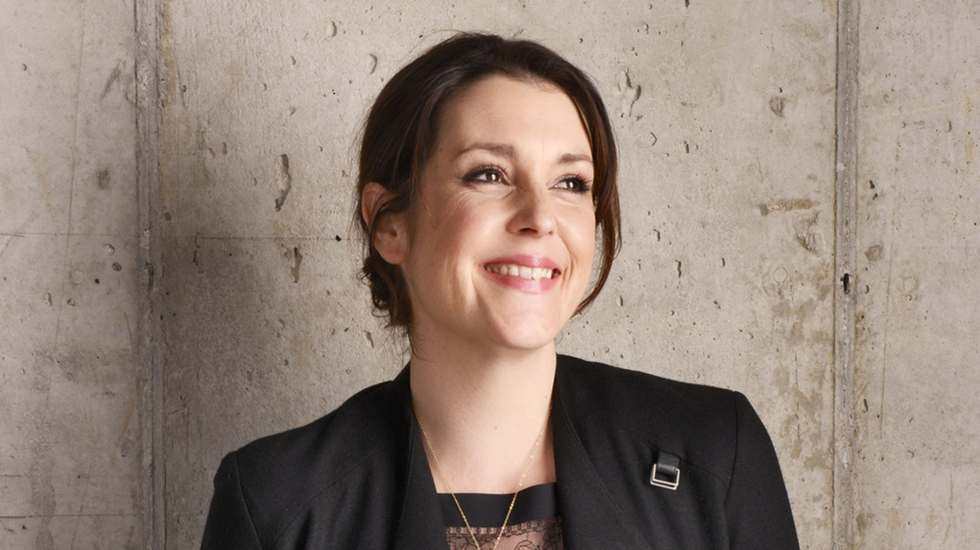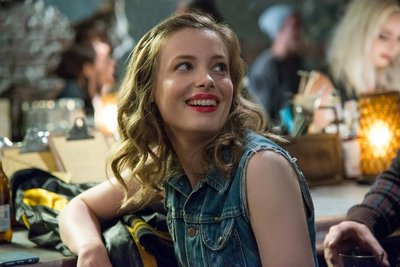
BY KAREN KEMMERLE |
Melanie Lynskey Talks ‘Goodbye To All That,’ ‘Togetherness’ And Online Romance
We talk with Melanie Lynskey about ‘Goodbye to All That,’ working in both TV and film, and how she chooses her roles.

Photo credit: Larry Busacca/Getty Images
It’s hard to believe that Angus MacLachlan's Goodbye to All That marked the first appearance of Melanie Lynskey at the Tribeca Film Festival. Since her debut in Heavenly Creatures at the tender age of 17, Lynskey has long been a staple on the indie film scene with memorable roles in Away We Go, The Informant! and Hello I Must Be Going.
We spoke to the lovely Lynskey about flawed female characters, building a backstory and why actors are seeking work on TV in lieu of the indie screens.
Tribeca: While Otto is the protagonist, it’s really the women in Otto’s life and his relationships with them that dictate the story. How important is it for female stories to be told, especially in independent film?
Melanie Lynskey: I think it’s so important. Like you said, this film may have a male protagonist, but there are so many interesting female characters. It was weird that at the Q & A after the Festival premiere someone said, “All the women are flawed! What are you trying to say about women?” First of all, I don’t think the women in this movie are flawed; I think they’re all human. Also, complex characters are just more interesting.
Tribeca: Right. You don’t have to have a movie full of unrealistically pristine female characters.
ML: Yeah [laughs] I can honestly say that there are no female stereotypes in this movie.
Tribeca: It was such an eclectic group of women. Did the women in the movie represent different stages in Otto’s life in a weird way?
ML: I never thought about it like that. To me, these women do represent the different ways that Otto sees himself, although all of these women are searching for a sense of themselves as well. It is an interesting parallel.
I don’t think the women in this movie are flawed; I think they’re all human.
Tribeca: What do you think the movie says about the ways that modern society deals with love and relationships?
ML: With all these new online dating methods, I think it’s very easy to feel like you are connecting through texting, emailing or just talking on the telephone [laughs] which no one ever does! But actually, these are not fulfilling ways to communicate—it’s actually hard to really be intimate anymore.
The whole thing confuses me a little bit. I’ve never done online dating, but I think it’s wonderful that people have a way to meet more easily then ever before.
Tribeca: It’s weird to me that our parents’ generation met through parties, social gatherings, church, etc. Now, it’s all online.
ML: The nature of how we interact with each other is evolving. So much of our lives are on the Internet now.
Tribeca: What initially drew you to the script, and how did you come on board the project?
ML: Angus actually sent the script to my agent and asked what character I would be interested in playing. I really felt like it would be right for me to play Annie. I just go by the feeling I have in my gut. When I was watching the movie at the Festival, I thought, “Oh, but Debbie Spangler would have been so much fun! And Lara too!”
However, at that point in my life, there was no other part for me. It was something I had to work out of myself and play that character. Other actresses were attached, but then after the shoot got pushed, they had to drop out. I remember Angus asking me if I was sure about Annie, and I was. I just knew that was the role for me.
Tribeca: Annie in Goodbye to All That is a nice follow-up to your role as Amy in Hello I Must Be Going. Both women are dealing with their marriages ending, albeit in different ways. Did you do any thinking about that previous character as you were playing Annie?
ML: Whenever I do something, I always get absolutely invested. With every role I take, I am working out something within me. It’s a very personal process. Something had happened in my own life that made me feel very ready to play someone like Annie. She’s a person who is decisive and knows what she wants. She deals with her feelings by going for a run, instead of lying on the sofa and being sad. I needed that.
I think women feel a responsibility to pass on to their daughters a sense of autonomy and a sense of being happy in your own skin.
Tribeca: The only information given about the marriage between Annie and Otto is that they have been married for 11 years. Did you and co-star Paul Schneider work to craft a backstory, and how did Angus help?
ML: We did. We had a few days of rehearsal with Angus, which was really nice. I hate rehearsals where you just go over the scenes again and again. I love it when you’re able to sit and talk about the scene with your fellow actors. Paul, Angus and I talked about how the Otto and Annie met, what their jobs were and the basic state of their lives. There was a story there about what initially connected them and how they ultimately grew apart.
Tribeca: Some of my favorite scenes in the movie are with Annie and Otto. I absolutely love the scene in which he reveals what he’s discovered about her.
ML: Paul’s just great in that scene.
Tribeca: He is! I love the line Annie says right at the end: “A woman has the right to be loved and to be known.” I was wondering if you could talk a little about shooting that scene and what that line says about the nature of women?
ML: I think, in a way for Annie, the line represents her justification for her shitty behavior. For her, it was better to leave the marriage and find a different relationship so that she could be herself. I think women feel a responsibility to pass on to their daughters a sense of autonomy and a sense of being happy in your own skin. They want their little girls to grow up being happy, feeling loved and knowing that they are worthy of love. I think that’s the main thing that made Annie leave. She decided essentially, “I don’t think I’m going to get what I need from this person.”
Tribeca: I just thought it was a beautifully acted scene. I also loved the break up scene in the therapist’s office. Which was the most difficult scene for you to shoot, and how did you deal with those obstacles?
ML: I think the scene in the therapist’s office was very hard emotionally. When I have a difficult scene like that, I feel grateful if I’ve had something to draw on in my own life. I feel grateful to have the opportunity to have that process; it’s very therapeutic to go through an emotion that you might have been running away from in your life, or not wanting to talk about too much, and then to be forced to do it over and over. So that’s kind of how I deal with it. I said to myself: “This is great. It’s going to be helpful, going to clear some stuff out. Bring some difficult things to the surface of this movie!”
With every role I take, I am working out something within me.
Tribeca: One interesting project I wanted to ask you about is your upcoming HBO show, Togetherness with Mark and Jay Duplass. You’ve also been on Two and a Half Men. How do you prepare differently for television as contrasted with film, and can you talk about the experience?
ML: I had two very different experiences with television. When I would go and do an episode of Two and a Half Men, it was usually very last minute because I wasn’t a regular cast member. I’d get the script two days before we filmed it. It’s a comedy and my character would typically do something crazy, so it was a lot of fun.
However, with the Duplass brothers, I got all the scripts before we shot the season. It was like shooting a movie. I knew the whole trajectory of the story and my character. I knew what things I needed to bring in at different times. I felt really grateful that they were so open with us about their storytelling process. It was more like shooting a film, and I loved it. We just wrapped the first season. I’m so excited! I miss it.
Tribeca: Did you watch Doll & Em?
ML: No, I keep forgetting to put that in my TiVO.
Tribeca: You gotta do it.
ML: Yeah, I keep hearing it’s so good.
Tribeca: It’s really wonderful. I love how HBO is letting independent filmmakers experiment and make their first TV shows. Indie film is moving towards television. Is that because it’s just so hard to get a movie made nowadays?
ML: It’s really so hard. It’s wonderful to be creative, but as an actor, you don’t make any real money. I make $100 a day when I do an independent movie. Plus, the movies usually aren’t longer than a three-week shoot. So when you make $1500 and then have to pay your agent, manager, business manager and taxes, it’s hard to live, you know? Though, I’m not complaining! However, I think that’s a big part of the reason that actors are looking to TV. I’ve been incredibly fortunate to be able to do as much as TV as I have. It’s allowed me to do the film roles I want to do.

